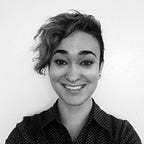Disability, diverse bodies, and felt democracy
This post of thoughts and reflections is intended to start conversations and represents our thinking at this time, as we reflect on our experience hosting a workshop with implications for democratic engagement, disability awareness and creative collaborative process.
It was initially crafted by poet Andy Jackson, Future of Health Fellow with RMIT’s Health Transformation Lab, Melbourne and co-authored by Alli Edwards, Centre for Public Impact Australia and New Zealand (CPI ANZ).
In our lives, in the complex and intimate spaces of community we inhabit, some words can feel too big or abstract to be helpful in the day-to-day. Other words feel particular, even uncomfortable, and we can assume they don’t have any connection to us. I’m thinking of the words ‘democracy’ and ‘disability’. Words so common, and perhaps so laden with official administrative and political processes, that we often don’t quite know how to respond to them.
An array of shapes made of felt. Soft to the touch. Greens, pinks, natural colours.
Together with RMIT’s social innovation hub, we explored how to tell more inclusive stories and learn together about such issues. We co-facilitated a session interweaving poetry and material storytelling. What emerged was not anything definitive or conclusive, but a sense of priorities and a way of engaging with each other that was democratic and sensitive to embodiment. This process reflects CPI’s commitment to interrogating not just what governments should be doing but how it might be.
A grove of trees. A beige person pushing a pram. Recycling bins. A podium and microphone. Arrows and roads.
To begin, Andy Jackson read a selection of poems from his work as the inaugural recipient of the Writing the Future of Health Fellowship, an initiative of RMIT’s Health Transformation Lab. The poems, written in pairs by Andy and Leah Robertson, Gaele Sobott, and Alex Creece, are raw and thoughtful. They explored the legacy of shame, the way disabling systems can be met with defiance, and the possibility of disabled and neurodiverse people being cultural leaders. Each poem wove together personal experiences and helped create a felt connection to the topics of the day.
Shapes, as soft as they are, are immense, heavily symbolic. They contain multitudes. What something might mean to you is not necessarily what it might mean to me.
A faucet. A bag of money. A person in a wheelchair. A tortoise.
UEntering into a intelectual topic like ‘democracy’ through poetry allowed people to connect to deeper and more personal issues. Andy describes that these emotions are always carried with us, to some degree or another. We carry traumas, doubts, desires, hopes, and griefs, and these are not entirely private. Even when noone else knows about them, they shape the ways in which we engage with others, including in public life, in the minutiae of interactions that together consist of our shared life. They shape our sense of whether we feel our opinions and lives are worthy of respect, whether we feel we will be listened to. Democracy can only grow out of how we negotiate these legacies, together.
We’re invited to pick a felt shape, talk about what it means to us, in terms of how we relate to the idea of democracy. Holding and speaking to the things we have chosen we’re hesitant, ambitious, sincere. We listen to each other and while no two descriptions of democracy are the same, some themes start to become clear.
Alli invited groups to form around some common themes that were emerging, around what decision-making processes looked like, whose voices were heard, and what is constrained by our current modes of decision-making.
We placed the felt shapes on the board as we chat, simultaneously shaping and giving form to the stories we are telling. They start to reflect collaborative clusters of priorities, dilemmas and dreamings. What voices are currently being given priority? How can we make space for other, minority voices? Tall grey buildings become vibrant with an Aboriginal flag, a circle of people, animals and trees inside. What changes in our institutions and processes when community is not just invited in, but given power, and the natural world around us is centred?
There is always more to explore. In listening to each other, gaps in knowledge about how decisions are made, obstructions and historical traumas become more clear, and more clearly challenging. There is a shared sense that without these conversations, nothing can change — but that these curious and empathic conversations need to be happening in more places, with more people, more often. In listening — and in sharing our own stories and imaginings — we plant seeds of thought, expanding what we are comfortable asking of our public institutions and capable of imagining. Each time we return to these complex conversations, we water these seeds.
Has this raised any questions for you? Want to discuss the power of making abstract concepts into tangible stories? Let us know in the comments below.
– Andy Jackson and Alli Edwards
Thanks to Daniel McLinden and RMIT’s Social Innovation Hub for organising this event as part of their Open Lab series.
About RMIT Social Innovation Hub and OpenLab events:
The RMIT Social Innovation Hub is an inclusive and collaborative co-working space where organisations, technology, research, innovators and ideas collide to co-create impactful solutions to wicked social challenges. It’s where new ideas, new partnerships and dynamic new platforms that address our thorniest social needs are developed and accelerated.
OpenLab events are designed to create interactive dialogue and to encourage our community to showcase some of the latest research, technology and practice in the social realm. If you are interested in attending or presenting at an OpenLab, you’re encouraged to email the team at socialinnovation.hub@rmit.edu.au
